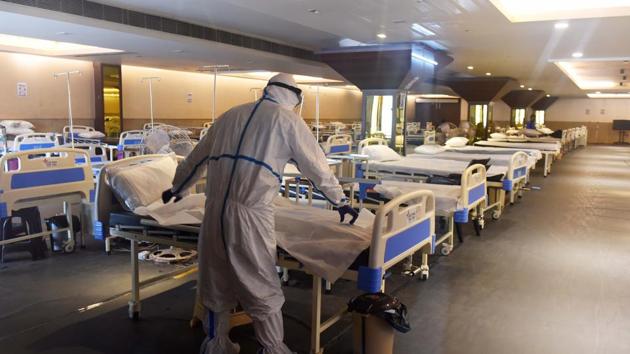As recovery rate improves in Delhi, 72% Covid beds free
Government reports showed that as on Monday, as many as 11,130 Covid beds in hospitals were vacant against the total of 15,359 beds.
With the recovery rate steadily rising in Delhi, the availability of Covid-19 beds in Delhi’s hospitals for the first time touched 72% in the second week of this month (July 6-12). The bed availability during the second week of June (June 8-14) was only 44%, government data showed on Monday.

“The numbers mean that today, more patients are being discharged than admitted in hospitals. As many as 72% of the total beds are now available and vacant in Delhi, as opposed to 65% last week. More beds are being added every week and these are reserved for patients with moderate to severe symptoms,” a media advisor to chief minister Arvind Kejriwal said on Monday.
The number of available beds continues to rise with nearly 200 more getting vacant on Monday. Government reports showed that as on Monday, as many as 11,130 Covid beds in hospitals were vacant against the total of 15,359 beds.
Also read| Covid-19: What you need to know today
On Sunday, 10,938 beds were available, the number on Saturday was 10,751 and 10,631 on Friday. Availability of Covid-19 beds in Delhi had crossed the 10,000-mark for the first time on July 6, when 10,051 beds were vacant.
Gauging the favourable conditions and easy availability of beds, the government has put on hold a plan to convert stadiums such as Talkatora and Pragati Maidan and more banquet halls into makeshift hospitals.
“Delhi’s recovery rate is 79.98% now, which is better than the national average of 62.93%. Plasma therapy has helped in improving the recovery rate as well as reducing the fatality rate which has declined to 3% now from 3.64% between June 22 and July 5. It is because of these positive indices that we do not immediately requite the creation of more large scale Covid facilities,” said a senior government official.
Click here for complete coronavirus coverage
Apart from attaching at least five hotels with hospitals, the government has attached eight banquet halls with big Covid-19 hospitals for them to be converted into Covid facilities. In addition, there is the 10,000-bed Sardar Patel Covid Care Centre and Hospital in the south district and the 500-bed Covid care centre in CWG village in east district. Besides, another 1,000-bed hospital has been built near Dhaula Kuan by DRDO. All of these are currently being largely underutilised due to lack of patients. The Sardar Patel centre in Chhatarpur, for example, has only 180 of its 10,000 beds occupied so far. At least 2,000 beds have been set up and are ready at the centre.
On Monday, 1,246 cases were reported, while 1,344 people recovered. There have been a total of 113,740 cases, of which almost 91,312 have recovered. Of the active cases, 11,170 are under home isolation.
An analysis of the bed occupancy on a weekly basis shows that in the first week of June around 215 more beds were being occupied by new patients on an average every day. In the second week of June, this came down to 171. A reverse trend began on June 22 when the number of those who recovered exceeded those who were admitted. From July 5 to July 12, as many as 139 beds were vacated by recovered patients on an average every day.
The government, however, has no plans to de-escalate the preparations made for Covid-19 treatment. Government officials had told HT that even though the number of the number of hospitalisations has gone down, the numbers may rise again just as it happened in Mumbai and other places across the world.
Also read: Coronavirus pandemic is going to get worse and worse and worse, says WHO chief
Experts agreed it would be premature to scale down the number of Covid beds.
Assuming the initial trends of the sero-surveillance data to be true, es, Delhi is a long way away from herd immunity. “There were reports that there is a 15% prevalence of the antibodies against Covid-19 in Delhi. This is not enough for herd immunity, which can protect those who are uninfected. Besides, we don’t even know whether the antibodies are enough to prevent a second infection — studies have shown that antibody levels are lower in asymptomatic patients and those with mild symptoms. Plus, we also don’t know how long the antibodies last in a person. The infection is spreading in the other parts of the country and there is a possibility of resurgence in Delhi,” Dr Arun Gupta, president of the Delhi Medical Council, had told HT last week.



